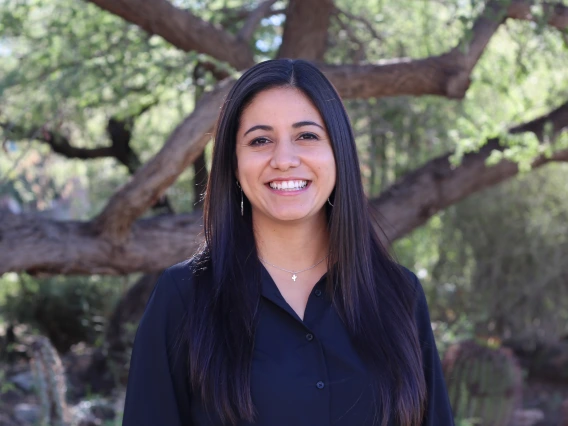
Karina M. Rodríguez, Recruitment Coordinator for the College of Humanities, has been selected to join the University of Arizona’s third cohort of HSI Fellows.
Rodríguez is one of 10 faculty and staff members invited to work on projects from conception to launch with the goal of supporting Hispanic undergraduate and graduate students. The program is sponsored by the Office of the Provost and participating colleges and departments.
Rodríguez, a College of Humanities alumna with a bachelor’s degree in French and a master’s degree in higher education, works with high school and college students, sharing information about the high-ranking degree programs and wide variety of career potential with a Humanities degree.
The University achieved Hispanic-Serving Institution status in 2018. It is one of 539 institutions in the United States to receive the designation, which is earned by having an undergraduate student enrollment that is at least 25 percent Hispanic.
“After learning the U of A got the designation, I remember thinking about what it means to serve Hispanic students at the university,” she says. “I wanted to be part of this group of change makers to really impact student success. What I’m looking forward to is making those connections with the other fellows and developing relationships because that’s what gets things moving. That solidarity is what’s most important with any project.”
The fellows are asked to commit four to five hours per week on their HSI projects and to take part in nine sessions, working in small groups toward shared interests that are reflective of the members and priorities from the office of Hispanic-Serving Institution Initiatives.
"We have really done some important work here and created a national model for investing in the development of faculty and staff to strengthen ambassadorship across campus for HSI initiatives," says Marla Franco, assistant vice provost for HSI initiatives. "Other HSIs and national professional organizations haven taken note of our efforts and this program is on their radar."
Rodríguez, who came to the UA from Phoenix, says she started college with a narrow perspective about what a major could be and what a career could be. Originally intending to focus on pre-medicine studies, she was originally a minor in French, but eventually switched it to her major, adding an Honors research project on language acquisition.
“I’d taken French in high school and that’s something that always interested me and I was passionate about the culture, the language, the food,” she says. “After junior year, I realized I enjoyed my French classes more than my science classes, so I just stuck with French. I was confident in the program and I knew I was getting a good education.”
Rodríguez became a College of Humanities Student Ambassador as a senior, gaining the tools to talk about the humanities and articulate those crucial skills on a resume. She also worked in the Admissions Office and Early Academic Outreach.
“As early as sophomore year, I was working in recruiting and focused on college access and success. That’s something I really enjoyed doing, so I started the higher education program for graduate school,” she says.
That background ties directly to her HSI Fellowship, which will focus on accessibility, equity and success for students from under-represented backgrounds.
“With the university’s land grant mission to serve the students of the state, and based on where we are in Tucson, a lot of students come from Hispanic backgrounds and have the language skills already. As a recruiter, what I talk about are the impact of those skills in communication and intercultural competence,” she says.
The College of Humanities is very intentional in educating students in the sort of skills they’ll be able to apply to any career path. Rodríguez works with departments and faculty to encourage internships and service learning to give students real-world experiences before graduating.
As an HSI Fellow, Rodríguez will work to leverage her position as College of Humanities recruiter into more direct outreach and service to Hispanic students, both before and after they enroll in the University. For example, connecting students with opportunities in the Department of Spanish and Portuguese can help improve career prospects, whether students are majors, minors, or fulfilling general-education language requirements.
“Being bilingual or multiligual/multicultural is life enriching and is huge in the workforce.” she says. “For students who already have those skills, it’s a huge benefit to come to the University of Arizona. The Spanish program here has one of the largest Spanish heritage programs in the country. Those who grew up speaking Spanish, but perhaps without the formal training, have wonderful opportunities here.
“The heritage program offers a space where students can find community and be around others who are like them – who had similar experiences growing up Latinx. When first-generation students come to the university, there’s a risk they can feel isolated or alone. Being in the Spanish program, there are so many people who come from similar backgrounds and know what you’re going through, so it’s a really special community in the College of Humanities.”

